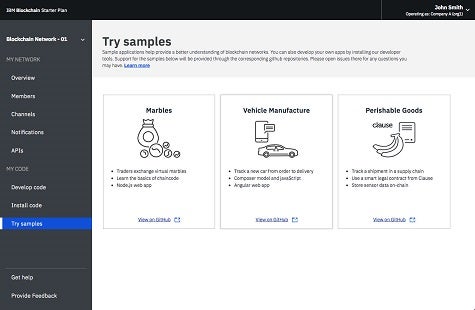IBM today made it a little easier for organizations to build their first blockchain applications by making available a starter kit.
Kathryn Harrison, a director of product management at IBM, says the IBM Blockchain Platform Starter Plan, now generally available, provides the tools needed to build and test blockchain applications in addition to providing the means to create a blockchain network on the IBM Cloud. Developers that download the IBM blockchain starter kit receive a $500 credit toward creating a blockchain network.
Based on the open source Hyperledger Fabric framework developed under the auspices of The Linux Foundation, blockchain applications basically consist of both an immutable database to store data and “smart contract” based on a distributed ledger that uses time stamps to keep track of what transactions occurred when. Hyperledger Fabric leverages container technology to host smart contracts known as “chaincode” that comprise the application logic of the system. Hyperledger Fabric was originally developed by Digital Asset and IBM before being donated to The Linux Foundation, which is seeking to make Hyperledger Fabric a de facto standard for building blockchain applications in the enterprise.
IBM already makes available an instance of the Hyperledger Fabric on IBM Cloud. Harrison says the IBM Blockchain Platform Starter Plan serves two purposes. The first is to encourage developers to build applications, the second is to encourage smaller companies that can’t afford the full IBM blockchain service to deploy their own small blockchain networks based on the tools IBM makes available.
“We’re making this available at a lower price point,” says Harrison.
It’s still unclear to what degree blockchain applications based on the technologies that enable digital currencies such as bitcoin will be employed across the enterprise. Interest in blockchain technologies is running high because they present an opportunity to eliminate reliance on a third party to verify transactions between members of blockchain networks. Use cases for blockchain technologies span everything from global supply chains and financial service to decentralized social networking. While there are examples of blockchain technologies being used with the parameters of a limited number of trading partners, it’s yet to be proven that blockchain technologies will be viable from a performance perspective at any larger scale.
As is often the case with emerging technologies such as blockchain, it’s now not so much whether blockchain technologies will be employed within enterprise applications, but rather to what degree.



